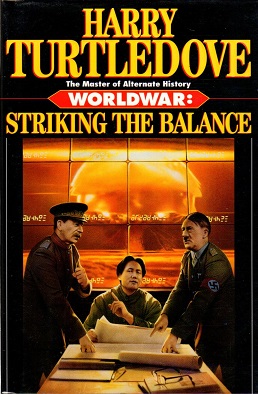Worldwar: Striking the Balance
 |
|
| Author | Harry Turtledove |
|---|---|
| Country | United States |
| Language | English |
| Series | Worldwar |
| Genre | Alternate history/Science fiction |
| Publisher | Del Rey Books |
|
Publication date
|
November 5, 1996 |
| Pages | 465 (hardcover edition) |
| ISBN | |
| OCLC | 34798124 |
| 813/.54 20 | |
| LC Class | PS3570.U76 W65 1996 |
| Preceded by | Worldwar: Upsetting the Balance |
| Followed by | Colonization: Second Contact |
Worldwar: Striking the Balance is an alternate history and science fiction novel by Harry Turtledove. It is the fourth and final novel of the Worldwar tetralogy, as well as the fourth installment in the extended Worldwar series that includes the Colonization trilogy and the novel Homeward Bound.
While the Race considers total annihilation or continuing hostilities, the humans make a stand for the sovereignty of the planet.
At the beginning of 1944, the Battle of Chicago has ended with the Race's forces decimated as a result of an American atomic bomb detonated in the heart of the city and destroying most of the city. German forces in Western Europe have successfully kept the Race from reaching the Rhine while managing to hurl back the Race's troops in Poland after a nuclear attack on Breslau. The Soviets have managed to stop the Race's assault on Moscow and accept the surrender of a band of disillusioned alien soldiers. After a landing in the United Kingdom, Prime Minister Winston Churchill inflicted a massive victory against the Race using mustard gas, gaining much abandoned technology, and inspiring the other nations to use poison gas.
The United States attempts to reverse engineer captured Race technology in an effort to create ballistic missiles at a military base in Couch, Missouri. Sergeant Yeager attempts to help Robert Goddard and other scientists with this research by interrogating captured aliens. By this point Yeager has become an expert translator of the Race's language, making him an invaluable asset to Goddard. In the process of his work, Yeager has developed a friendship with two of the alien prisoners, Ristin and Ulhass. Both members of the Race show an alarming adaptability to American customs, learning to play baseball and adopting human slang, along with a surprising willingness to help their human captors.
...
Wikipedia
